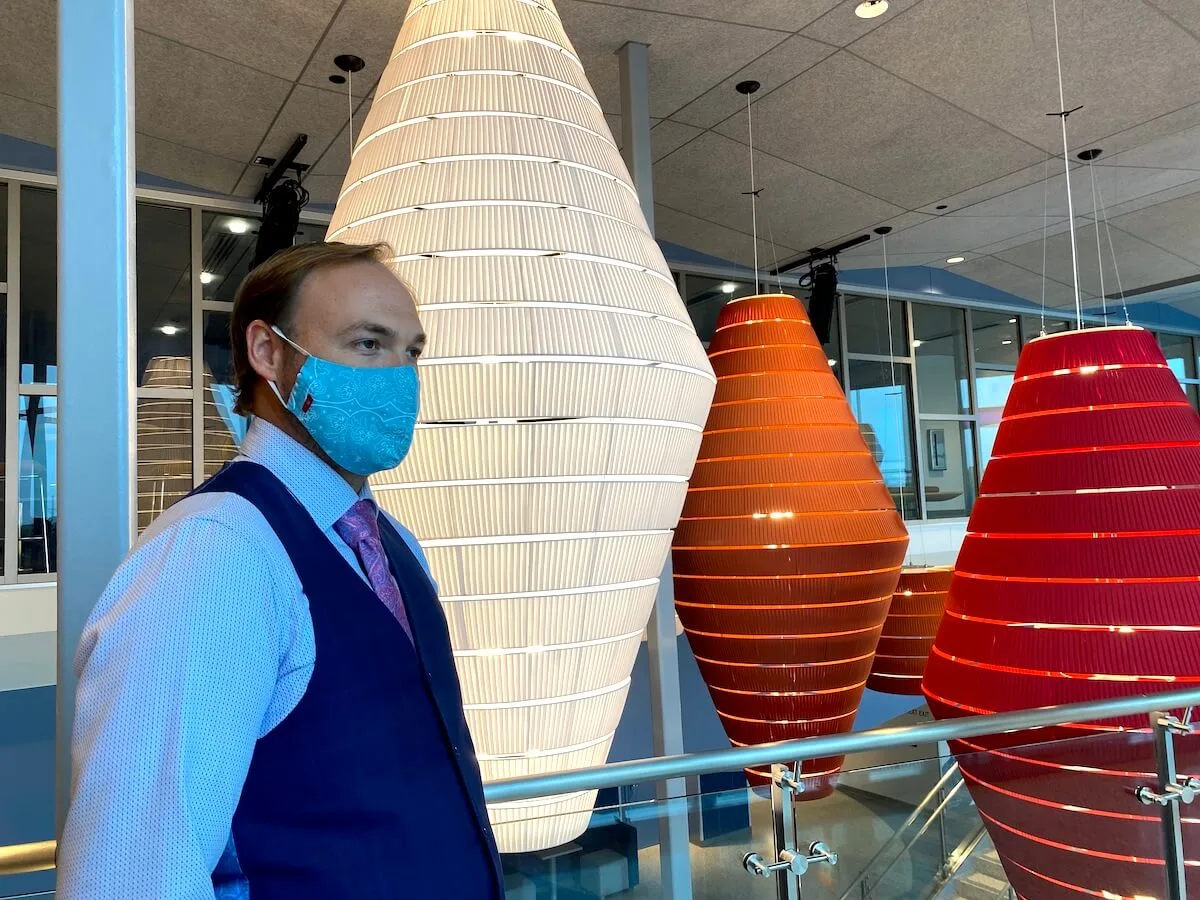
#image_title
A federal grant program kept some venues, like the Pablo Center in Eau Claire, from closing permanently.
Federal grant funding totaling $170 million in much-needed coronavirus relief dollars to entertainment venues across Wisconsin is not only helping those sites financially but in some cases is preventing their temporary or permanent closures, US Sen. Tammy Baldwin said during a visit to Eau Claire Friday.
Entertainment and other arts-related operations that qualified for the funding received it in July through the Shuttered Venues Operators Grant (SVOG), made possible by the Save Our Stages Act, of which Baldwin, a Democrat, was an original co-sponsor. Congress approved the bill in December. That legislation includes $16.25 billion nationally for operators or arts-related venues and festivals.
Those dollars were especially needed by arts and entertainment organizations, Baldwin said, because they were among the first to shut down because of the coronavirus pandemic and are among the last to open. She spoke about the grant program during a media event Friday morning at the Pablo Center at the Confluence in downtown Eau Claire following a tour of the arts center.
Funding through SVOG “allowed us to keep all of these incredible assets to our communities alive,” Baldwin said, noting not only the aesthetic value the arts bring to communities but the spinoff economic benefits as well. “I know that this didn’t make [arts venues] whole. But for many it made a difference in terms of preventing stuttering permanently, or shuttering temporarily.”
Many arts and entertainment operations closed their doors in March 2020 as coronavirus cases began to climb in the state. Because of large gatherings at many entertainment events, and the close proximity of people to each other, the spread of COVID-19 has been a big concern in the industry.
Many such venues have remained shut down since first closing, while others have only resumed operations this spring and summer when vaccinations became widely available and the number of new virus cases dropped for a time. The loss of revenue has strained operations, and without government assistance, many of them may not have remained viable, Baldwin said.

SVOG money, received by qualifying Wisconsin arts and entertainment operations in July, was essential for the Pablo Center at the Confluence to continue operations, Executive Director Jason Jon Anderson said. The $65 million facility is a focal point of Eau Claire’s downtown revitalization effort and has prompted substantial surrounding development.
RELATED: COVID Relief Funds Were ‘Saving Grace’ for Cash-Strapped Cities
The Pablo Center received $975,000 through the SVOG program and is scheduled to receive another $571,000 in supplementary funding through the program this month or next, Anderson said. It is one of 218 arts-related operations in Wisconsin to receive SVOG dollars and one of 19 in the Eau Claire area getting a combined $10.5 million of that money.
“This has been a vital lifeline that ensured that we were able to retain our staff,” Anderson said. “I can’t envision what it would have looked like if our regional and state organizations wouldn’t have received this funding. How many organizations wouldn’t be here today?”
The Pablo Center, which opened in September 2018, has not hosted public events since March 2020. The facility has a $2.2 million annual operating cost, and without federal money, the Pablo faced a deficit of about $1.2 million, Anderson said. The arts center’s employees were on furlough and Anderson said he was cutting costs wherever he could. But those austerity measures wouldn’t be enough to balance the budget, he said.
“We were in a really tough place,” Anderson said. “As a team, we were asking, ‘Are we going to be here going forward? How long does this [pandemic] last?’”
Other Wisconsin arts and entertainment venues have faced similar struggles during the pandemic. The Children’s Museum of Eau Claire closed when the pandemic began and is in the process of fundraising for a new site scheduled to open in late fall 2022. The museum used its available resources, including endowment funds, to remain financially viable during the past 18 months, Executive Director Michael McHorney said.
So when the museum received a $129,000 SVOG grant, it provided a financial reprieve of sorts, he said.
“This helps us keep afloat until we open our new building,” McHorney said, noting the museum “would have really struggled” to raise money to make up the deficit at the same time it is attempting to solicit funds for its new site.
Arts and entertainment operators are grateful to welcome back attendees to their events. But increasing numbers of COVID-19 cases in recent weeks and the prevalence of the especially contagious Delta variant are prompting concerns about those venues being able to continue to host audiences.
Operators at the Pablo Center and other Wisconsin venues are requiring face masks to prevent spread of the virus and proof of COVID-19 vaccination. Baldwin said she’s optimistic such measures will prevent another shutdown of those operations, and if that does happen, leftover SVOG money will provide further financial relief. In addition, Congress is considering additional measures to help arts and entertainment operations, Anderson said.
“We need to do everything we can to keep [arts and entertainment venues] open,” Baldwin said. “The performing arts are so important to our society. [They] really serve to bring communities together.”
Anderson agrees. The Pablo Center serves not only as the hub of the Eau Claire region’s vibrant arts scene but also plays a vital role in its economy. A view from the structure’s windows shows nearby hotels, coffee houses, and other businesses built and renovated at least in part because of the arts center’s location there.
“The idea was if we can do the Pablo, then all of these other endeavors become possible,” Anderson said. “We need this building to be here, to continue to operate, and this [SVOG] funding is a big part of helping us do that.”
After 18 months without hosting an event, the Pablo will stage one Sept. 11 and another the next day. After the struggles during the pandemic, those performances will be emotional, Anderson said. He hopes such events can become commonplace again.
“To hear the main PA system make sound again, to hear the sounds of people’s voices and applause, it’s going to be amazing,” he said.

Daylight saving time: Wisconsin’s reminder for emergency preparedness
As daylight saving begins, Wisconsin emphasizes emergency preparedness, urging residents to update plans and kits for severe weather and unexpected...

Free lead testing in Milwaukee: What you need to know
Lead poisoning in Milwaukee is back in focus after a case at Golda Meir Lower School. Officials stress the importance of testing for children. In...

Struggling with your mental health after surviving a disaster? Here’s how to look after yourself
By MARIAM FAM Associated Press There's the initial shock and chaos in a collective disaster like the deadly and destructive California wildfires....

Wisconsin certified direct care professionals can now get free training & bonuses
Find out how you could benefit from Wisconsin DHS's free training for certified direct care professionals, available in three languages. ...




